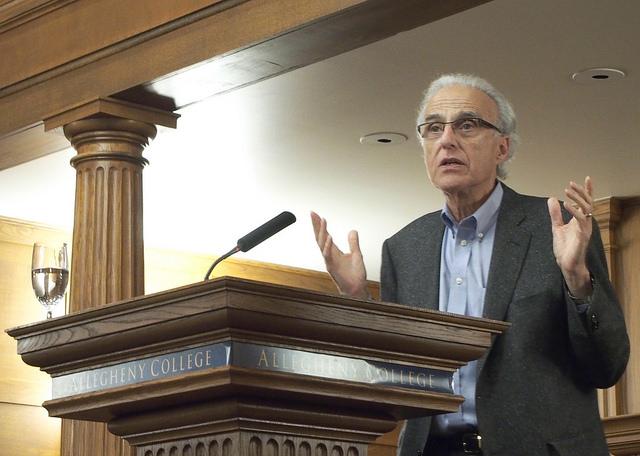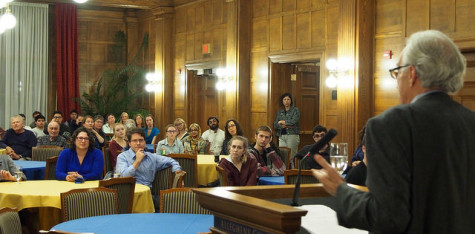Esposito gives lecture on Islamophobia
John Esposito, professor of internal affairs and Islamic studies at Georgetown University, leads a talk about Islamophobia in the U.S. on Tuesday, Sept. 29, 2015, in the Tippie Alumni Center.
John Esposito, professor of religion, international affairs and Islamic studies at Georgetown University, came to speak on “Building Bridges: Protecting Pluralism, Ending Islamophobia” on Sept. 29, 2015. Preceding his talk, he lead a workshop on “The Future of Islam and Democracy after the Arab Spring.”
Department Chair and Associate Professor of Philosophy and Religious Studies Eric Boynton accompanied Esposito during his time at Allegheny.
According to Boynton, Esposito is an extraordinary resource for the college.
“Professor Esposito is probably one of the foremost scholars of Islam in the world right now,” Boynton said.
During his workshop, Esposito gave background history of the political situations in Tunisia and Egypt, ranging from the 1990s to present day. He likened the “democratic experiment” in those countries to the American Revolution, pointing out how long it took for slavery to be abolished and for women and minorities to have a say in politics.
According to Esposito, colonialism is one of the reasons democracy did not develop these countries. When Europeans controlled the region, they decided who was in power, leaving no autonomy to the people. He believes it could take 10-20 years for true democracy to start taking root.
“Democracy is inevitable, and I think that some countries will continue to grapple with it,” he said.
Esposito focused on religious studies that he was less familiar with, like Confucianism and Islam, while in college after struggling with his own stereotypes of them.
“Depending on people’s values…you often see what you want to see,” Esposito said.
According to Esposito, the study of religion only a few years ago was not called religions of the world, and did not consist of any Islamic teachings, although Islam is the second biggest religion in the world.
Esposito hoped after students attended his talk, they would understand that there are not as many differences between Muslims and those following Christian faith as they think there are.
“The vast majority of people in the Muslim world are like Americans,” Esposito said.
Religion has been used to legitimize and delegitimize wars for centuries, according to Esposito, so knowledge of the various religions who are influential on political policies is crucial.
During his talk, he focused largely on the development of media in relation to the Islamic world between the 1980s and 2000s. He opened with the statistic that news coverage of Islamic extremism went from two percent to 25 percent in that time, and he believes stories now come from social media and are only picked up by the news when they go viral.
Before a Time article was released in August of 2010 with a cover questioning if the U.S. was Islamophobic, there was not even a word to describe the attitudes many citizens harbored toward the Islam faith.
Esposito spoke of the discussions on news outlets that the Islamic prophet was a pedophile and people encouraged forcibly converting people of Islamic faith to Christianity. Prominent political figures like Rick Santorum have publicly spoken out about the dangers of Islam, making it hard not to notice the increased hype.
Allison Cabo, ’17, is one citizen who has noticed the increased coverage. She believes that having more events like Esposito’s talk will decrease the judgment about groups of people that are less common in everyday U.S. life.
“I think they should expand on other ethnic and religious topics too,” said Cabo.
She said that, although it can be hard to confront your own prejudices, it is important to be self-aware and have a fair judgment of people.
“Because of our general lack of knowledge about [Islam], it’s an issue,” she said.
Esposito recommended visiting bridge.georgetown.edu in order to access a news outlet that he said contextualizes politicians’ opinions on the issues drawn upon.
The article has been updated with the correct Georgetown web address.










Gary Fouse • Oct 3, 2015 at 1:37 pm
Esposito is much more than a defender of Islam. He is an apologist for radical Islam. In that respect, what he puts out is disinformation.
Nogero • Oct 2, 2015 at 3:47 pm
“Esposito recommended visiting bridge.georgetown.net in order to access a news outlet that he said contextualizes politicians’ opinions on the issues drawn upon.”
bridge.georgetown.net does not exist except for a “Coming Soon” page.